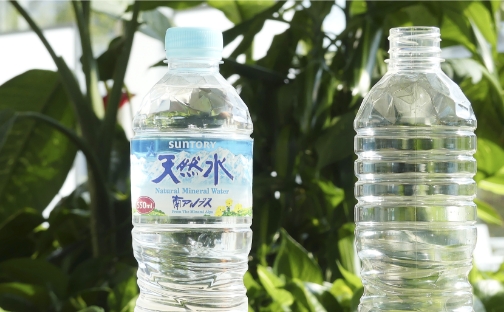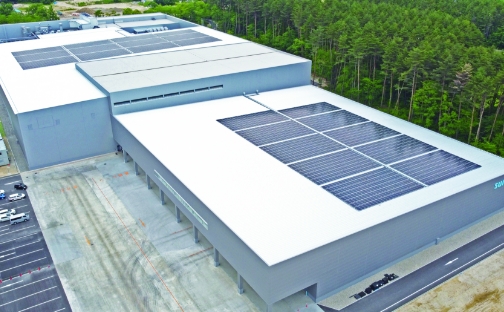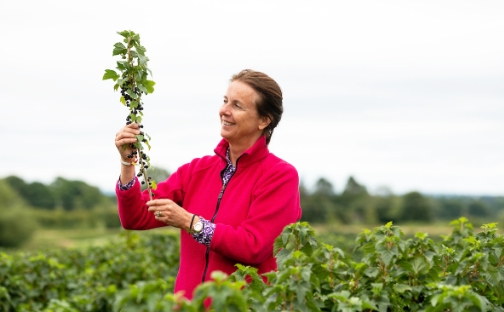Context
Addressing climate change is one of the most critical challenges for Suntory Group in terms of business continuity and sustainable growth. Suntory Group's operations, supported by natural resources such as water and crops, could be significantly affected by risks such as water shortages and reduced crop yields due to climate change. For example, a shortage of water, our principal ingredient, could lead to a temporary halt in plant operations, potentially leading to missed opportunities, while decreased agricultural yields may increase the cost of procuring ingredients.
On the other hand, rising temperatures also present new business opportunities, such as the growing demand for bottled water and beverages that prevent heat stroke.
Given the presence of both risks and opportunities, Suntory Group declared our support for the Task Force on Climate-related Financial Disclosures (TCFD) recommendations in 2019 and have incorporated the analysis of business impacts from climate change and corresponding measures into our management strategy.
Governance
Suntory Group has established a clear governance structure, overseen by our Board of Directors, to address climate change challenges. Our Board of Directors regularly monitors our strategies and initiatives related to climate change, receiving reports from our Global Sustainability Committee (GSC) and Global Risk Management Committee (GRMC). The GSC deliberates on mid- to long-term strategies relating to water resources, climate action, and other sustainability issues, while the GRMC is the central element of our Group-wide risk management system, discussing and monitoring key risks, including those related to climate change. The GSC and GRMC are also responsible for establishing Risk Management Committees and Sustainability Committees at each of our key operating companies, and drafting and implementing concrete strategies and measures relating to climate change at the individual business level. Key issues explored by these 2 Committees are brought before the Board of Directors, who conduct the ultimate deliberations and decision-making.
Responsibility for and initiatives around climate action are also incorporated into our business strategy at the senior management team level. Our President takes ultimate responsibility for our climate action, while our Chief Sustainability Officer is in charge of evaluating and managing climate change-related risks and opportunities. Sustainability targets are part of the evaluation criteria for executive compensation, and the degree to which climate action targets are being met is reflected in evaluations and compensation of our senior management team. Every quarter, our Board of Directors also receives reports on the progress of our climate action measures and risk status, alongside which they hold regular seminars with external expert guests, allowing them to integrate advice based on the latest information into their management practices. With this structure, we have firmly anchored our initiatives on climate change within the Group’s business strategy and decision-making process.
Strategy and Risk Management
Suntory Group’s climate action strategy involves approaching the issue from 2 angles: promoting decarbonization and strengthening our business resilience (our ability to adapt to climate change). We began by investigating and identifying a comprehensive list of the risks and opportunities that may be brought about by climate change, then conducting scenario analyses that evaluates the degree of business impact and likely incidence of these risks over the short- (0–3 years), mid- (3–10 years), and long-term (10–30 years).
We hypothesized various sets of future business conditions, using the Intergovernmental Panel on Climate Change (IPCC)’s RCP8.5 scenario to represent a situation in which global warming progresses, and the International Energy Agency (IEA)’s Net Zero Emissions by 2050 Scenario (NZE Scenario) to represent one in which decarbonization is advanced, among others.
This allowed us to identify rising costs due to the introduction of carbon taxation, insufficient water supply to our production sites, and increased costs for procuring ingredients due to reduced crop yields as risks that could potentially have a particularly significant impact on our business.
For more information on financial impacts, see our Disclosure Based on TNFD & TCFD.
Suntory Group is taking the following strategic measures in response to the key risks we have identified.
- Addressing Transition Risk (Increased Carbon Costs):
Starting in 2021, e adopted an internal carbon pricing framework within the Group to incorporate carbon pricing into our capital investment decision-making. we plan to have invest approximately 100 billion yen by 2030 to promote decarbonization, actively transitioning to renewable energy and introducing energy-efficient equipment. These investments are expected to reduce annual greenhouse gas (GHG) emissions by approximately 1 million tons as of 2030. - Addressing Physical Risks (Water Resources):
We conduct water risk assessments for all our owned production sites to evaluate the water resource conditions of their locations and identify water usage risks, including areas with high water stress. Our goal is to return more than 100% of the water used in our factories to the local communities through efforts to improve and reduce water usage efficiency at the plants, as well as through water resource conservation activities. - Addressing Physical Risks (Ingredient Procurement):
We predict and evaluate future yield changes of agricultural raw materials based on climate models to develop stable procurement strategies for key ingredients. We are adopting measures to mitigate climate change impacts on our ingredient procurement, advancing initiatives including piloting sustainable agricultural practices in collaboration with our suppliers and other business partners. - Addressing Other Risks:
We are also taking action on acute risks such as flooding caused by major typhoons or torrential rainfall, conducting hazard and risk assessments at all Suntory Group sites and incorporating the findings into our disaster plans and business continuity plans.
At the same time, climate change also presents new opportunities for Suntory Group. As average temperatures rise and heatwaves multiply, demand for w beverages that prevent heat stroke and for bottled water is expected to grow. To meet this expanding demand, we are investing in enhancing production capacity and strengthening product line-up. Proactive initiatives to address climate change also enhances our corporate brand value and provides the opportunity to expand our support among environmentally conscious consumers.
For many years, Suntory Group has continued initiatives such as the Suntory Natural Water Sanctuariy Initiative, which aims to enhance forest water resource recharge functions and restore biodiversity and Mizuiku - education program for nature and water, an environmental education program for the next generation. We strive to enhance social recognition of these activities to build trust in our brand and maintain market advantage. Additionally, from a resource circulation perspective, we pursue innovations such as the development of advanced recycling technologies for used PET bottles to achieve both raw material cost reductions and GHG emission reductions.
Suntory Group’s climate action strategy and our action on risks and opportunities related to this issue are implemented within the framework of our integrated risk management system. This system comprehensively manages risk across the Group, with the GRMC playing a central role and Risk Management Committees and Teams in place at each of our operating companies. Through it, we identify, assess, and monitor major risks, including climate change risks, on an annual cycle. Key subjects discussed by the GRMC and GSC are brought before the Board of Directors, and planning, execution, and evaluation (PDCA) of measures are carried out on an ongoing basis, approved and overseen by our senior management. Through this governance system, we aim to enable agile and systematic responses to climate change risks while reliably incorporating climate-related opportunities into our business strategies.
Indicators and Targets
Suntory Group has set and disclosed clear indicators and numerical targets to measure progress in addressing climate change. In our long-term vision, Suntory Environmental Vision toward 2050, we aim for net-zero GHG emissions across the entire value chain. Our mid-term plan, Environmental Targets toward 2030, specifies concrete GHG reduction targets for 2030.
The GHG reduction targets outlined in the Environmental Targets 2030 have been certified by the Science Based Targets initiative (SBTi) as being aligned with the Paris Agreement's 1.5°C target.
Our key targets are outlined below.
- Environmental Targets toward 2030:
Reduce GHG emissions from our direct operations by 50%,* reduce GHG emissions across our entire value chain by 30%* - Environmental Vision toward 2050:
Aim for net zero GHG emissions across the whole value chain
- *Based on emissions in 2019.
To achieve these goals, we disclose our GHG emissions performance and progress annually and ensure thorough monitoring based on KPIs. Using 2019 as the baseline year, we calculate GHG emissions (Scope 1, 2, and 3) and assess the numerical impact of reduction measures. As of fiscal year 2024, we have achieved a 32% reduction in Scope 1 and 2 emissions compared to 2019, and a 13% reduction across the entire value chain, putting us on track to meet our 2030 targets.
Additionally, we have accelerated our adoption of renewable energy at our business sites. By 2022, we achieved 100% renewable energy usage for electricity at 63 major company locations globally. We also set environmental KPIs, including energy efficiency, renewable energy ratio, and water usage, to quantitatively assess our climate change mitigation and adaptation efforts. Moving forward, we will continue to manage progress based on these indicators and implement measures according to our roadmap toward achieving net-zero by 2050.
Our Initiatives
Suntory Group is engaged in efforts to reduce GHG emissions across the entire value chain and to adapt to climate change. We aim to achieve net zero GHG emissions across our entire value chain by 2050 and have set out 2030 targets of reducing emissions from our own operations (Scope 1 and Scope 2) by 50% and emissions throughout our value chain (including Scope 3) by 30%, compared to 2019 levels. To achieve these targets, we are implementing measures at each stage, from procurement of ingredients to production and logistics, all the way to delivery to our customers.
- Raw Material Procurement and Supply Chains:
In the production and procurement stages of raw materials, we work with business partners to promote GHG emission reductions. Every year, we hold policy briefings for our major business partners where we share our sustainability initiatives, and conduct surveys and engage in dialogue to help them set emissions reduction targets. Additionally, we are incorporating methods such as regenerative agriculture to reduce GHG emissions and enhance climate resilience associated with raw material production. For example, in sourcing barley as a malt ingredient, we are collaborating with overseas partners and farmers to implement soil regeneration and agricultural improvements, balancing agricultural GHG emission reductions with biodiversity conservation. In packaging materials, we are also working to use recycled materials and reduce the weight to reduce the carbon footprint at the raw material procurement stage. - Production (Suntory Sites):
We are accelerating energy conservation efforts and the introduction of renewable energy to reduce emissions from our plants and business sites (Scope 1 and 2). We have implemented internal carbon pricing in our investment decision-making, prioritizing projects with significant GHG reduction impacts. In Japan, we have installed photovoltaic systems and switched to biomass boilers, and are also venturing to leverage next-generation infrastructure, including adopting large-scale energy storage solutions and hydrogen systems at our plants.
For example, we are currently in the process of installing a 16-megawatt P2G system, which will use renewable energy to produce hydrogen, at our Hakushu facilities in Yamanashi Prefecture, aiming for operation in 2025. In addition, our mineral water plant in Nagano Prefecture has become Suntory’s first production plant in Japan to achieve net zero CO2 emissions t utilizing solar and biomass energy, sourcing additional energy from renewable sources, and offsetting. In addition to these advanced measures, we are also promoting energy efficiency improvements and equipment optimization across all sites to meet our 2030 goals. - Logistics:
We are working together with our partner logistics companies to reduce GHG emissions associated with product transportation and delivery. We are advancing efforts to optimally position our production sites and sales areas in order to reduce the distance that products must travel from our plants to their delivery destinations, and are cooperating with other companies on joint distribution, shared container shipping, and other solutions to increase efficiency. Our approach to truck transportation includes increasing the load factors of the large vehicles we use and switching to alternative fuel vehicles or rail transport, allowing us to implement transportation with lower GHG emissions compared to conventional methods. At distribution centers for our products, we have collaborated with partner companies to obtain Green Management and ISO 14001 certification, and monitor energy usage and GHG emissions for individual warehouses and vehicles to facilitate improvements in these areas. These measures enable us to balance environmental impact reduction with efficiency improvements in logistics. - Product and Customer Contributions:
As part of our adaptation measures to climate change, we aim to contribute to society through our products and services. For example, we are developing and providing functional beverages suitable for preventing heatstroke, addressing the risks posed by rising temperatures. We continue to conduct awareness activities for consumers and communities, such as heatstroke prevention seminars in supermarkets and elementary schools. Moreover, we contribute to global action on climate change by participating in international initiatives. Suntory Group’s goals have been approved to be aligned with 1.5°C targets by the Science Based Targets initiative (SBTi) and we signed onto the Business Ambition for 1.5°C campaign. We have also endorsed the TCFD recommendations and conduct scenario analysis and information disclosures in line with these.








